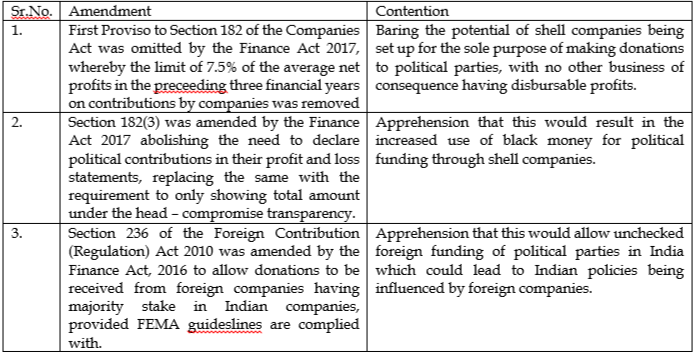Electoral Bonds - to cleanse the system of political funding
- Manal Shah

- Jun 7, 2019
- 3 min read
Finance Minister Arun Jaitley discussed the introduction of Electoral Bonds (“EB”) in his speeches and introduced it in Annual Budget 2017-2018. Passing of the Finance Act 2017 introduced various amendments to the Income Tax Act, 1995, the Representation of People Act, 1951 among others with a view to enabling the functioning of the EB Scheme 2018.
The Government of India notified the EB Scheme 2018 vide Gazette Notification dated January 02, 2018 in the exercise of powers under Section 31(3) of the Reserve Bank of India Act, 1931. It defines an EB as a ‘bond issued in the nature of promissory note which shall be a bearer banking instrument and shall not carry the name of the buyer or payee’. This P-Note like bond is used for funding eligible political parties and are interest less.
EBs were introduced with a view to creating higher transparency in political funding, as its buyers are traceable by the banks through their KYC details. This was envisaged by ensuring clean money enters into the system while protecting the donor’s anonymity. In the six tranches of EBs floated until November 2018, bonds worth INR 1,056.73 Crores were purchased.
These bonds can be purchased by a citizen or a body corporate established in India. These are receivable by political parties registered under Section 29A of the Representation of People Act 1951 and which secured not less than one per cent of the votes polled in the last General Election to the House of People or the Legislative Assembly of the State.
EBs are issued in the denomination of INR 1,000, INR 1,00,000, INR 10,00,000 and INR 1,00,00,000. These have to be encashed by eligible political parties only through a Bank Account with the Authorized Bank (i.e., authorized branches of the SBI). These are purchasable for fifteen days each in January, April, July and October as may be specified by the Central Government. An additional period of thirty days shall be specified by the Central Government in the year of General Elections of the House of People. The Bank would follow the extant RBI instructions regarding KYC norms of a customer for all EB applicants.
The EB scheme raised several concerns, mainly pertaining to transparency. Association for Democratic Reforms (“ADR”) and Anr. v. Union of India & Ors.[1] led to an elaborate discussion on these in the Apex Court. Petitioner alleged that the scheme affects transparency in political funding inasmuch as in the annual contribution reports of political parties to the Election Commission of India (“ECI”), there is no requirement for mention of the identity of the donors who have contributed to the coffers of political parties through EBs. This affects the Citizens Right to Know. Further, the removal of Cap on donations and FCRA amendment was challenged as opening avenues of foreign contributions to Indian political parties.
The Apex Court in its Interim Order dated April 12, 2019 noted the ECI Affidavit wherein it stated that while answering the Respondent vide its Letter No. 56/PPEMS/Transparency/2017 dated 26.05.2017, it had informed the Ministry of Law and Justice that certain provisions of the Finance Act, 2017 and the corresponding amendments will have serious repercussions/impact on the transparency aspect of political financing. The letter had highlighted that the donation received by political parties had been evidently taken out of the ambit of reporting under the Contribution Report as prescribed under Section 29C of the Representation of the People Act, 1951. This results in the uncertainty in establishing whether or not the political party has taken any donation in violation of provisions under Section 29-B of the Representation of People Act 1951 which prohibits the political parties from taking donations from the Government companies and foreign sources.
In its Order, Supreme Court acknowledged that “the rival contentions give rise to weighty issues which have a tremendous bearing on the sanctity of the electoral process in the country.”
Interim Order
The Apex Court gave an interim direction in this matter requiring all political parties who received donations through EBs to submit the detailed particulars of the donors as against each bond, (namely, the particulars of the bank account to which the amount has been credited and the date of such credit) to the ECI in a sealed cover. These details will be furnished forthwith in respect of the EBs received by the political party till the date of the Order. The details of such other bonds may be received by such a political party up to the date fixed for issuing such bonds as per the Note of the Ministry of Finance dated February 28, 2019, i.e. May 15, 2019, will be submitted on or before May 30, 2019, the sealed covers will remain in the custody of the ECI.
[1] Writ Petition (Civil) No. 333 of 2015 (Supreme Court).







Comments